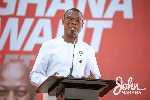Akufo-Addo Cabinet ‘isolating’ MoF on individual bondholders’ haircut move – Bright Simons claims EMT, Jubilee not in Ofori-Atta’s corner
 Bright Simons
Bright Simons
Jubilee House and the Economic Management Team are not in favour of the inclusion of individual bondholders in the domestic debt exchange programme, the Vice President of IMANI Centre for Policy and Education, Mr Bright Simons, has claimed.
According to him, even the Akufo-Addo Cabinet has broken ranks with Mr Ofori-Atta on the matter.
“How long can Finance Ministry hold out against sentiment in Ghana's Economic Management Team that individuals must be formally exempted from the debt exchange programme?” Mr Simons asked in a tweet, adding: “And, now, reports of Jubilee House also moving in that direction. Ministry insists 5% in 2023 is last offer”.
“Meanwhile, the Finance Ministry is pretty isolated at Cabinet this afternoon. Will be interesting to see whether their nerves will hold as the rest of the government begins to buckle under pressure”, he added.
How long can Finance Ministry hold out against sentiment in Ghana's Economic Management Team that individuals must be formally exempted from the debt exchange program? And now reports of Jubilee House also moving in that direction. Ministry insists 5% in 2023 is last offer.
— Bright Simons (@BBSimons) January 26, 2023Meanwhile, the Finance Ministry is pretty isolated at Cabinet this afternoon. Will be interesting to see whether their nerves will hold as the rest of the government begins to buckle under pressure.
— Bright Simons (@BBSimons) January 26, 2023In the meantime, the Agbogbomefia of the Asogli State, Togbe Afede XIV, has said the government of Ghana should first look at cutting down its expenditure and plugging financial loopholes to save the country money before extending the burden of the current economic crisis onto individual bondholders through a haircut in the domestic debt exchange programme.
Togbe Afede made the suggestion when the Individual Bondholders Forum paid a courtesy call on him on Thursday, 26 January 2023, to rally support against the government’s inclusion of individual bondholders in the debt exchange programme.
The Forum, led by Mr Senyo Hosi, has tabled some proposals before the government through which the country could save GHS83.5 billion.
Togbe Afede believes the government must clean its house first before touching any individual’s bond proceeds.
“What expenditures can we cut out? Maybe, new and not-very-essential capital projects. What can we suspend? Ongoing, maybe unnecessary capital projects”, the traditional leader noted, as well as turning attention to the “size of government, payments to individuals, ex gratia, all kinds of allowances, monies that we spend on travels, et cetera”.
“There is so much room, I believe, for cutting expenditure”, he stressed, adding: “And that is where, I think, we should be looking at first of all”.
“If one goes by the estimates that have been put out there with regard to how much the nation loses to corruption annually, it suggests that there is room for trimming down government expenditure”, Togbe Afede stressed.
Mr Hosi, during the call, told the chief: “Togbe, the matter is an eye-red matter, and, for someone who has led the capital market and being one of the players who birthed the capital market – besides your royal place as the Agbogbomefia of the Asogli State – you are a pioneer in this industry”.
“I do not want to believe this is your voice and the destination you assured us when your voice was heard back then”, Mr Hosi noted.
“So, we are here to petition your office, to petition you, as an individual, and the state of Asogli, not to sit by and watch the lives of 6.5 million people devastated and subjected to shackles of penury”.
“So, our plea here is very simple: the steps being taken by the government are unsustainable and very unnecessary.”
The Forum’s proposed money-saving measures include enforcing property taxation and VAT invigilation, recovering funds lost to financial irregularities as identified by the Auditor-General, divesting loss-making, defunct and troubled 17 state-owned enterprises, privatising selected SOEs to Tier-2 pension funds to drive efficiency and productivity, and reviewing the Free SHS Programme to make it more efficient through effective targeting and allowing parents who can pay to do so among others.
“The measures proposed above, per the estimation of the IBF, yield net savings of GHS83.5bn”, the IBF said in its report, adding: “The above recommendations are competent enough to urgently address the fiscal challenges and enable us to reach the desired 55% debt-to-GDP target proposed to the IMF”.
Read the IBF’s full report below:
REPORT OF THE GOVERNMENT OF GHANA (GOG)-INDIVIDUAL BONDHOLDERS’ FORUM (IBF) TECHNICAL COMMITTEE ON THE EXCLUSION OF INDIVIDUAL BONDHOLDERS FROM THE DOMESTIC DEBT EXCHANGE (DDE) PROGRAMME
25th January 2023
1.0 Introduction
The Government initially exempted individuals when it launched the DDE programme on 5th December 2023.
Subsequently, the government amended the original Invitation to Exchange to include individual bondholders (IBs) with a belief that the terms of the amended Invitation to Exchange improve the economic terms and offer individual investors the opportunity to participate in such enhanced terms.
Although no restrictions are contemplated for the trading of the non-tendered eligible bonds (“Old Bonds”), the liquidity of Old Bonds after an exchange is usually much more limited than the liquidity of the new bonds. In addition, the market value of new bonds can potentially be higher than the value of the Old Bonds. The reason the government amended the Invitation to Exchange is to allow individual legal holders of record of Eligible Bonds to participate in the exchange.
Following the amendment of the exchange to include individual bondholders in the perimeter of the DDE Programme, a petition demanding the exclusion of the individuals was issued on 13th January 2023 by the Individual Bondholders’ Forum (IBF), a representative body for individual investors (collectively known as “Individual Bondholders”) in GoG notes and bonds, ESLA bonds, Daakye bonds, Ghana Eurobonds and Collective investment schemes with investments in all those securities.
The government called for a meeting on 18th January 2023 to have a dialogue with the Individual Bondholders’ Forum (IBF) and to explore mutually beneficial options within the debt sustainability limit that will lead to the landing zone of present value (PV) of the debt-to-GDP ratio of 55% by 2028.
During the meeting, a technical committee was constituted, comprising membership from GoG and IBF to work together to explore options for excluding the individual bondholders from the DDE Programme and its impact on the landing zone of 55%.
The Committee, comprising two members, each, from the GoG team and the IBF team on the resolution of issues of individual bondholding in the DDE Programme. The GoG team was led by Mr. Samuel Arkhurst and the IBF team was led by Mr. Senyo Hosi.
The members of the Committee are:
No. Name Institution/Position Membership
1. Mr. Samuel Arkhurst, Director, TDMD, MoF, Leader of the GoG
Team
2. Dr. Alhassan Iddrisu, Director, ESRD, MoF Member
3. Mr. Senyo Hosi Convenor, IBF Leader of the IBF
Team
4. Mr. David Tetteh, Convenor, IBF Member
5. Mr. Martin Kpebu (Esq.), Convenor, IBF IBF Member,
In attendance
6. Dr. Adu Anane Antwi Convenor, PBF Observer
The Committee is supported by a secretariat as follows:
1. Mr. Kwame Gyesaw, Unit Head MFPU, MoF
2. Ms. Elizabeth Owiredu, Unit Head DCM, MoF
3. Mr. Abdul-Fatawu Hakeem, SEO, MoF
2.0 Terms of Reference
The IBF identified their coverage of investments to include individual holders of bonds as well as Individuals who have investments in Collective Investment Schemes (CIS). However, the pensioners distinguished individuals who are natural persons holding securities registered under the Central Securities Depository (CSD).
The Committee agreed on the following as its Terms of Reference (TOR):
i. Identification of key issues by individual bondholders and Collective Investment Schemes (CIS) in the DDE Programme.
ii. Explore mutually beneficial options within the debt sustainability limit that will lead to the landing zone of 55% PV of debt-to-GDP by 2028, resulting from the exclusion of individual bondholders in the Domestic Debt Exchange (DDE) Programme; and
iii. Any other matter consequential to the DDE Programme.
3.0 Summary of Presentation on the DDE Programme
The leader of the GoG team made a short presentation on the debt exchange programme summarised as follows:
i. The total universe of domestic debt instruments covers, Treasury Bills (91-Day, 182-Day, and 364-Day), Treasury notes and bonds (2 to 20 years), ESLA, Daakye, Cocoa Bills, Non-Marketable securities, and the domestic US Dollar bond;
ii. For purposes of the debt exchange programme, Treasury Bills are excluded whilst GoG notes and bonds, ESLA and Daakye are included;
iii. The Debt Sustainability Analysis (DSA) using the IMF DSA Framework undertaken by MoF shows that Ghana’s public debt is high and unsustainable. The analysis shows that the PV of the debt-to-GDP ratio is over 100% against a debt sustainability threshold of 55%. This means that to achieve debt sustainability, Ghana must implement policies and programmes to reduce the debt-to-GDP ratio in present value terms by at least 45 percentage points (ppt) in the medium term.
Debt service, comprising interest and amortisation payments (domestic and external) alone constituted a provisional 100% of total revenues in 2022;
iv. It is a requirement that a country accessing an IMF (Fund) Programme should demonstrate that its debt is on a sustainable path before the country can secure a Programme from the Fund;
v. Government is, therefore, addressing the debt sustainability issue through measures including fiscal adjustments, structural reforms, and debt operation all of which are in line with the IMF Programme being negotiated;
vi. The debt operation entails both domestic and external debt;
vii. The above measures put the debt-to-GDP ratio in PV terms at 55%; and
viii. Excluding the pension funds from the DDE programme worsens the debt-to-GDP ratio by 1.8 ppt., thereby making the 55% threshold unattainable by 2028.
4.0 Summary of Presentation by Individual Bondholders’ Forum (IBF)
4.1 The IBF Case
a. The inclusion of individuals in the DDE will destroy household confidence in Ghana’s financial system and securities market. It will shift savings and investments away from the official banking system. This is evident in Ghana’s economic and social history.
b. With households being the primary source of loanable funds in the Ghanaian economy, the occurrence of the above will deplete the stock of loanable funds, private and public sector access to credit, and stifle growth. The impact may be irreparable or may require a longer term to regenerate confidence.
c. The fall in confidence will worsen our currency depreciation challenges, as more individuals rationally turn to foreign currencies as a mechanism to store the value of their wealth or savings.
d. Following the banking crisis, most individual investors opted to invest in the lower-returning GoG securities for safety reasons and to provide security of returns required to meet pertinent needs such as medication, children’s education and the general welfare of their families. The social impact of the DDE programme as currently presented for individuals is the harshest on anyinvestor category and catastrophic to the livelihoods of about 1.3mn local individual investors and 6.5mn dependents. Unlike other investor categories likely to benefit from the Financial Stability Fund, Individual Bondholders have no support to fall back on.
e. The value of IB’s holdings which has been built over years is instantly wiped off by 77%-88% on acceptance of the DDE programme. This is untenable.
f. The individual bondholding and holdings through collective investment schemes stand at about GHS15.5bn, representing about 11% of the eligible bonds and the capitalised interest. With the set target of 80% of eligible bonds, Individual Bondholders are not a critical success factor to the viability of the DDE programme as you envisage, yet the impact of their inclusion has incalculable consequences.
g. The debt accrued was used for the purposes of the entire populace, it is, therefore, inequitable to single out bondholders only to suffer the cost of a benefit that other investors and citizens benefitted from. Why is there no equal intervention for individuals who opted to invest in real estate instead of financing the State?
4.2 The IBF Position
The IBF identifies with the need to achieve debt sustainability but holds that the inclusion of individual bondholders and collective investment schemes will be economically counterproductive and socially catastrophic. The IBF, therefore, maintains that IBs be exempted from the DDE Programme. Debt sustainability should be attained through the following:
i. Fiscal adjustments;
ii. Revision of the DDE proposal to the structured groups such as the Banks and Insurance entities;
iii. Grow GDP:
• Reduce the crowding-out effect of the government’s excessive net domestic borrowing to pave access for real sector financing to spur growth;
• Revise GoG’s posturing to investors to deepen investment in the extractive
sectors (upstream and mining); and
iv. A committed fight against corruption.
4.3 Fiscal Readjustments
The IBF, consequently, recommends that Government reviews and makes the following specific adjustments to its revenue and expenditure to contain the current economic crisis:
Fiscal Section Fiscal Readjustment Est. Revenue/Savings (GHS)
Revenue: a. Enforce the filing of interest/coupon income on corporate
instruments (ESLA, Daakye, Cocoa bills) as part of Personal Income Tax (PIT) and effect the 25% tax related to the income. Alternatively, revise the 1% withholding of the related securities to 20% and make it final and deductible at the source. This creates an additional revenue of circa GHS104 million for the current fiscal year.
GHS104mn (Savings)
b. Oil production has dropped from over 200kbpd to below 160kbpd yield revenue loss more than $300mn (GHS3.6bn) in 2022. The government should, as a matter of urgency, review the regulatory and fiscal environment to encourage existing producers to ramp up production and develop new fields.
GHS3.6bn (Savings)
c. Government should exercise its right under the Aker petroleum agreement (Deepwater Tano) to repossess the block or compel the immediate commencement of development by the contractor. This field has the potential of delivering up to 100kbpd yielding over GHS5.6bn per year to the government.
GHS 5.6bn (Savings)
d. Expedite reforms to enforce property taxes. With landed properties of circa 2,200,000 in Ghana (Ghana Population and Housing Census 2021), we anticipate that achieving an average annual rate of GHS1,000 per property at a collection efficiency of 50%, will yield the government over GHS1.1bn in revenue.
GHS1.1bn (Savings)
e. Rise above politics and fully enforce the VAT invigilation that saw the rise of VAT revenue by 1000% in some cases. This assumes a 15% over the 2023 estimated VAT collection of GHS23.7bn
GHS3.5bn (Savings)
f. Pursue the recovery of funds lost through financial irregularities
of MDAs in the Auditor General’s Reports (2015-2022). Source:
2nd Fiscal Recklessness Index Report, 2020 (page 2).
GHS13.9bn (Savings)
g. Pursue the recovery of the over GHS5bn tax evasion in the petroleum downstream sector (2016-2021). Source: CBOD Petroleum Industry Report 2020/21.
GHS5bn (Savings)
h. Divest loss-making, defunct and troubled 17 State-own enterprises (as identified and announced by the Ministry for Public Enterprises).
GHS1bn (Savings)
i. Privatize selected SOEs to Tier-2 pension funds to drive efficiency and productivity. The government will realize funds from the divestiture with ownership still retained by the workers of Ghana. These SOEs may include the Electricity Company of Ghana (ECG) and Ghana RE.
GHS20bn (Savings)
j. Review and rationalize the budget of SOEs and increase capping of high revenue generating SOEs to shore up central government revenue and reduce waste in SOEs.
GHS1bn (Savings)
k. The BOST Margin should be converted into a levy and channelled into government revenue. BOST is a fully commercial entity and it is untenable to continue to tax the public to fund its activities while it charges commercial rates for its services.
GHS300mn (Savings)
l. Revise royalties for new and yet-to-renegotiate mining leases from the standard 5% to 15%. For example, the payback period for the new lithium mines is less than five months with an internal rate of return of 224% and yet government royalties is set at 10%.
Not estimated
Expenditure
m. The budget provision for the energy sector shortfall of Ghs23bn should be revised downwards by GHS3bn through the reduction of transmission losses, technical losses, and administrative inefficiencies. Effectively implement the Energy Sector Recovery Programme (ESRP) recommendations.
GHS3bn (Savings)
n. Cap the subsidies on the premix petroleum at Ghs200mn thereby reducing the budget by GHS150mn. Owing to the wanton abuse of this subsidy, provide discount coupons to registered fisherfolks for the purchase of premix.
GHS150mn (Savings)
o. Maintain the 2022 capital expenditure level by reducing the nonABFA MDA and foreign finance Capex provisions by 50%.
GHS10.7bn (Savings)
p. Reduce transfers to statutory funds. Except for DACF, NHF and GETFund, the transfers to all other statutory funds should be reduced significantly from the 15% of tax revenues approved in the 2023 budget to 10%. Special focus may be placed on GNPC, Ghana EXIM Bank and MIIF.
GHS7bn (Savings)
q. Review and right-size MDAs and SOEs to maintain compensation expenses equivalent to 2022. This should include drastically reducing the number of MDAs, Ministers, and staff at the Office of Government Machinery (e.g. Presidential Staffers).
GHS6.5bn (Savings)
r. Review the Free SHS Programme to make it more efficient through effective targeting and allowing parents who can pay to do so.
Beneficiaries should be students that patronize Senior High Schools in their communities whilst other students should pay for boarding. However, the government can pay for students who do not have Senior Secondary schools in their communities.
GHS1bn (Savings)
The measures proposed above, per the estimation of the IBF, yield net savings of GHS83.5bn. The IBF holds the position that the above recommendations are competent enough to urgently address the fiscal challenges and enable us to reach the desired 55% debt-to-GDP target proposed to the IMF.
4.4 Other Recommendations
a. Lend the US$900mn Ghana Heritage Funds to the Bank of Ghana to shore up the reserves.
b. Restructure the fiscal council to include a creditors committee made of reps from all investor classes in GoG local bonds and empower the council to be an enforcing and binding institution and not just an advisory body. This may be key to ensuring and sustaining the fiscal discipline required to realise our debt sustainability.
5.0 Observations
The Government team whilst amenable to some of the proposals/recommendations from the Individual Bondholders’ Forum (IBF), stressed the complexities with implementation given that some revenue/expenditure measures are of a medium-term nature and being considered by the government as part of its structural reform agenda and medium-term domestic revenue mobilisation strategy. However, any proposal that can be implemented immediately should be considered towards a speedy resolution of the current economic crisis.
6.0 Conclusion
The Technical Committee emphasizes the need for continued engagements between the GoG and IBF on the debt exchange programme as well as the government’s structural reforms to ensure macroeconomic stability and promote economic recovery and, on the feasibility of the proposed measures.
Mr. Samuel Arkhurst Mr. Senyo Hosi
Director, TDMD, MoF Convener, IBF
Source: Classfmonline.com
Trending News

E/R: Kwahu Traditional Council gives IGP three-week ultimatum to release Abene Chief’s Palace
02:22
Mahama orders $78m payment to Justmoh to resume Agona–Nkwanta road works
08:01
Youth unemployment now a National security concern – Opare Addo
08:43
Parliament approves concession agreement for Accra-Kumasi expressway
08:15
Gender Minister hosts Christmas feast for children in residential care homes
02:09
GFL Secretary-General warns NDC against arrogance and complacency in power
07:54
Weija Water Treatment Plant to shut down for scheduled maintenance today Dec. 19
07:07
60 lives lost at Madina Zongo junction as pedestrians ignore footbridge-MCE
07:10
C/R: MP announces plans for nursing training college, new SHS in Kasoa
02:01
Wa West MP commends Energy Minister Jinapor for improved power stability
09:03




